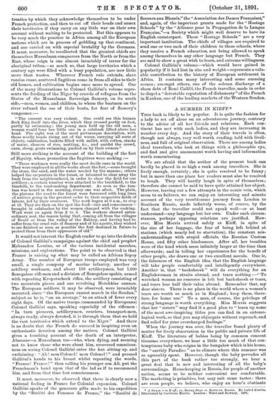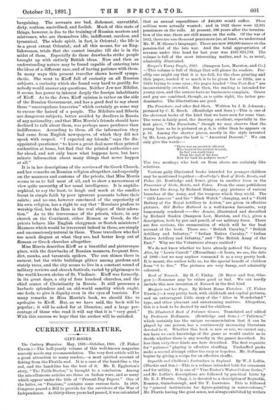A SUMMER IN KIEFF.* THIS book is likely to be
popular. It is quite the fashion for a lady to set off alone on an adventurous journey, contrary to the advice of all her friends and relations. Each con- tinent has met with such ladies, and they are increasing in number every day. And the story of their travels is often, though not always, very well worth reading, told with liveli- ness, and full of original observation. There are among ladies ideal travellers, who look at things with a philosophic eye, and find and give amusement worth having and information worth remembering.
We are afraid that the author of the present book can hardly be placed in so high a rank among travellers. Sbe is lively enough, certainly ; she is quite resolved to be funny ; but in more than one place her readers must also be resolved to laugh. They will hardly laugh in spite of themselves ; therefore she cannot be said to have quite attained her object. However, leaving out a few attempts in the comic vein, which seem to us failures, we can enjoy an interesting and minute account of the very troublesome journey from London to Southern Russia, made infinitely worse, of course, by the fact that the traveller could not speak well—or at least understand—any language but her own. Under such circum- stances, perhaps opposing relations are justified. How- ever, Miss Morris arrived safely at Kieff, in spite of the size of her luggage, the fear of being left behind at stations (which nearly led to starvation), the constant mis- understandings with stupid officials, the Russian Custom House, and fifty other hindrances. After all, her troubles were of the kind which seem infinitely larger at the time than afterwards ; and in telling her experiences for the benefit of other people, she draws one or two excellent morals. One is, the falseness of the English idea that the English language will take people comfortably and intelligently everywhere. Another is, that " backsheesh " will do everything for an Englishwoman in straits abroad, and tears nothing :—" To wretched woman no resource is left but backsheesh or tears, and tears lose half their value abroad. Remember that, my dear sisters. There is no place in the world where a woman's tears are worth so much as in England ; keep them, there- fore. for home use." To a man, of course, the privilege of strong language is worth everything. Miss Morris suggests that her " sisters" may find it a good plan to " learn up some of the most awe-inspiring titles you can find in an entomo- logical work, so that you may objurgate without reproach, and find relief for your overcharged feelings."
When the journey was over, the traveller found plenty of matter for lively observation in the public and private life of Kieff. The literature of babies being by common consent tiresome everywhere, we hear a little too much of that con- temptuous baby who reigns in the bungalow which is his home, the " earthly Paradise " as to climate where this summer was so agreeably spent. However, though the baby pervades all this part of the book rather too strongly, we hear a great deal that is new and interesting of all the baby's surroundings. Housekeeping in Russia, for people of another nation, seems to be neither convenient nor comfortable. The marketing is primitive, but may suit some tastes : there are even people, we believe, who enjoy an hour's obstinate
A Swum r in k,eff ; or, Sunny Days in Souti,rrn Russia. By Isabel Morris. Illustrated by Cochrane Morris. London Ward and Downey. 1891.
bargaining. The servants are bad, dishonest, untruthful, dirty, restless, uncivilised, and foolish. Much of this state of things, however, is due to the training of Russian masters and mistresses, who are themselves idle, indifferent, careless, and tyrannical. The whole spirit, in fact, is Oriental ; the life is to a great extent Oriental; and all this means, for an Eng- lishwoman, trials that she cannot imagine till she is in the midst of them. Especially do these drawbacks strike people brought up with entirely British ideas. Now and then an understanding nature may be found capable of entering into the ideas of a different race, and of having patience with them. In many ways this present traveller shows herself sympa- thetic. She went to Kieff full of curiosity on all Russian subjects, a curiosity which she found very hard to gratify, for nobody would answer any questions. Neither Jew nor Nihilist, it seems, has power to interest deeply the foreign inhabitants of Kieff. As to the Jews, Kieff opinion is rather on the side of the Russian Government, and has a good deal to say about those "unscrupulous knaveries" which certainly go some way to excuse the hatred of a people. The Nihilists and Siberia are dangerous subjects, better avoided by dwellers in Russia of any nationality; and that Miss Morris's friends should have declined to talk about them, was perhaps more prudence than indifference. According to them, all the information they had came from English newspapers, of which they did not speak with respect. " I expected my friends," says the dis- appointed questioner, " to know a great deal more than printed authorities at home, but find that the printed authorities are far ahead, and not only know what happens here, but have minute information about many things that never happen at all."
It is in her descriptions of the services of the Greek Church, and her remarks on Russian religion altogether, and especially on the manners and customs of the priests, that Miss Morris -seems to us to fail most of all, and to show a narrowness of view quite unworthy of her usual intelligence. It is unphilo- sophical, to say the least, to laugh and mock at the candles burnt in simple faith by poor ignorant peasants before their saints ; and no one, however convinced of the superiority of his own religion, has a right to say that " Russians profess to worship God, but the Ikon is the real object of their adora- tion." As to the irreverence of the priests, where, in any -church on the Continent, either Roman or Greek, do the priests behave like English clergymen or Scotch ministers ? Manners which would be irreverent indeed in these, are simply and unconsciouslynatural in them. Those travellers who feel too much disgust at what they see, had better keep out of Roman or Greek churches altogether.
Miss Morris describes Kieff as a beautiful and picturesque place, with the drawbacks of Russian manners, frequent fires, dirt, monks, and tarantula spiders. The sun shines there in earnest, but the white buildings glitter among gardens and stately trees, and the city seems to live in a constant round of -military reviews and church festivals, varied by pilgrimages to the world-known shrine of St. Vladimir. Kieff was formerly, in its great days, a city of four hundred churches, and the chief centre of Christianity in Russia. It still possesses a barbaric splendour and an old-world sanctity which ought, one feels, to give it dignity even in the eyes of tourists. For many remarks in Miss Morris's book, we should like to apologise to Kieff. But, as we have said, the book will be popular ; it will be asked for at libraries; and a large per- centage of those who read it will say that it is " very good." With this success we hope that the author will be satisfied.



































 Previous page
Previous page